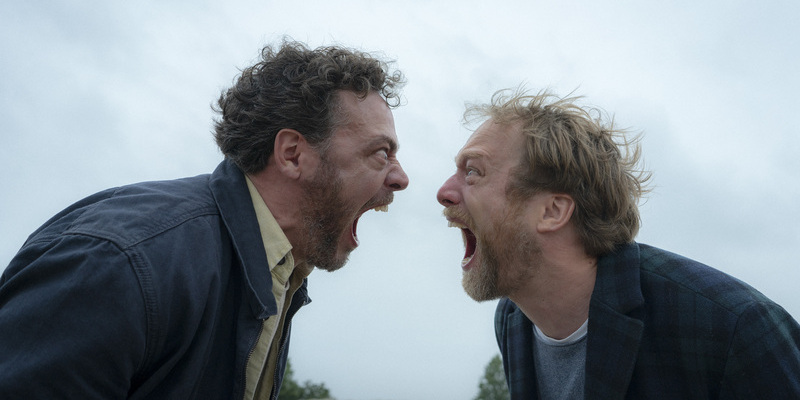
A Danish couple accepts a Dutch couple's invite to stay at their home,
with increasingly sinister consequences.
Review by
Eric Hillis
Directed by: Christian Tafdrup
Starring: Morten Burian, Sidsel Siem Koch, Fedja Van Huêt, Karina Smulders, Liva
Forsberg, Marius Damslev

Most of us who have travelled to foreign countries will be familiar
with the idea of making temporary friends with fellow travelers, usually
for as simple a reason as sharing a common language. Such brief
relationships usually end with obligatory invitations to "come and visit
us if you're ever in…," but nobody ever takes up such offers, and we
assume they're made without an ounce of sincerity (well at least for
Europeans, Americans usually genuinely mean it). In
Christian Tafdrup's Speak No Evil, a holidaying couple decide to follow up their new friends'
invitation, with disastrous consequences.

While vacationing in Italy, timid Danish couple Bjorn (Morten Burian) and Louise (Sidsel Siem Koch) and their young daughter Agnes
(Liva Forsberg) strike up a friendship with charismatic Dutch
couple Patrick (Fedja van Huet) and Karin (Karina Smulders) and their young son Abel (Marius Damslev), who was born
without a tongue and can't communicate verbally. Patrick and Karin make
the obligatory gesture of offering a stay in their home in the Dutch
countryside, and Bjorn and Louise are surprised when they receive a
postcard several months later reiterating the invite.
"What's the worst that could happen?" asks a friend of Bjorn and
Louise, who recall Agnes getting along well with Abel and decide a break
might be just what they need. After all, it's only an eight hour drive
away and aren't the Dutch just like the Danes? They both hate the Swedes
for one thing.

What follows is an increasingly unsettling comedy of manners in the
vein of Ruben Ostlund and a brooding study of humanity at its cruellest
ala Michael Haneke. Tafdrup impressively integrates both disciplines so
well that we often find ourselves confronted with situations in which
we're unsure whether we should laugh or be horrified. The film exploits
subtle cultural differences between the Danes and the Dutch, and
audiences of the latter persuasion may well take offence to some of the
stereotypes employed (the classic Dutch stereotype of stinginess takes
centre stage in one particular sequence). From my experience of both
nations, Danes tend to be very like the Irish in that they go out of
their way to avoid confrontation whereas the Dutch are actively
confrontational and seem to actively enjoy needling and shocking others
at every opportunity. That might sound like a broad stereotype, and it's
just my take, but it's one Speak No Evil certainly backs
up. As soon as Bjorn and Louise have arrived at their home, Patrick and
Karin seem to go out of their way to make them uncomfortable. At first
it's through subtle micro-aggressions, like ignoring Louise's
pescatarian diet by serving meat, groping one another in front of the
embarrassed Danes, leaving the kids with a babysitter who turns out be a
middle-aged man and blaring the car stereo while driving drunk.
Despite Louise's insistence that they leave immediately, and even one
foiled escape attempt, they stick around, largely out of a fear of
offending their hosts. It's a scenario many of us will relate to, as
we've all stuck around in awful situations because we didn't want to
come off as ungrateful. Every time Bjorn and Louise summon the courage
to confront their hosts over some offensive action, Patrick and Karin do
a good impression of playing innocent, often putting it down to cultural
differences. It's the desire not to come off as xenophobic that likely
fuels Bjorn and Louise's inability to simply walk away from the scenario
- the babysitter is an Arab, and Louise's reaction suggests she hates
the idea of leaving her child with a man but is more worried about being
accused of racism.

For its first 80 minutes, Speak No Evil is a brilliantly
played social thriller that will have your skin crawling. Some cultures
may find Louise and Bjorn's inaction difficult to swallow, but as a
fellow Northern European I could fully relate to their decision to
attempt to bury their heads in the sand and hope it all blows over. What
I couldn't relate to however was the turn the film takes in its final 15
minutes. All of the movie's good work is almost dismantled by character
behaviour that I just couldn't accept. Take the kids out of the equation
and I might have easily accepted Bjorn and Louise allowing themselves to
be continuously bullied, but even the most timid of parents will turn
into absolute psychopaths once their children are threatened. The full
reveal of the extent of Patrick and Karin's evil equally defies logic,
as there is no way they could get away with their actions in modern
Europe. Many filmmakers have imitated Hitchcock, but too many ignore his
warning that while much tension can be mined from a ticking bomb, you
should never let the bomb go off. Tafdrup has constructed a ticking bomb
scenario par excellence here, but when he detonates his metaphorical
bomb, his film's verisimilitude is caught in the explosion.


